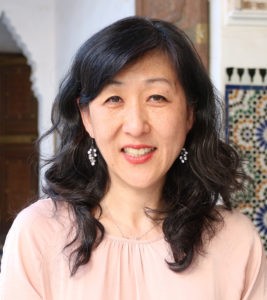What we know today to be the traditional “Asian accent” tells the story of Asian American assimilation in essence. The generation of Asian immigrants before us possessed the accent that white Americans saw as the most foreign in comparison to all the other possibilities, leaving the future generations to reflexively shape their speech into perfect, respectable “white” voices.
If you are like me, a first-generation Asian American who immigrated with their family, I can expect that you probably speak neutral, unaccented English, and your parents probably did not. The accent of our parents is the accent of polluted Chinatown streets, loud restaurants, cheap takeout, exotic food stalls with sharp smells, fake bags, unpopular men and nail-filing women. Thus, we compensate for our parents’ sacrifices to settle successfully in our roles as genteel doctors, engineers, academics and lawyers, far away from those presumed beginnings of our American ancestries.

Grace Ji-Sun Kim
So it is no surprise that we feel so unhinged — whether we show it or not — to the quintessential “ching-chong” taunt we heard back in the schoolyard.
When we are mocked for our language and our capacity to “sound normal,” we are mocked for our capacity to simply be normal. It is to mock and delegitimize everything we have worked for. However, we should not be mistaken that being able to speak “normal” English is to exercise privilege. During this time of COVID-19 and the rise of anti-Asian racism, it is particularly upsetting to see so many mocking Asian Americans and making fun of our accents.
The Ellen Show has been on a downward spiral this summer for many reasons, including reports of a toxic working environment and racism. In the name of comedy, Ellen made fun of Sofia Vergara’s Colombian English-speaking accent on numerous occasions. Her studio audience cracked up in laughter, which only encouraged Ellen to continuously do it almost every time Vergara was on her show. Those who watched Ellen from home also chuckled and laughed every time she made fun of the accent.

Sofia Vergara and Ellen DeGeneres in a screen cap from The Ellen Show.
In one show, Ellen sits with Vergara and says, “Literally you have been on this show for 10 years and your accent has gotten worse. How is that possible?” Whenever Ellen did that, I cringed inside as it brought back all my horrible memories of being made fun of due to my Asian accent.
First-generation children of immigrants will likely know the familiar experience of translating for our parents. It was not only for practical purposes, such as going to the bank or reading important mail, but more poignantly, to save face for them and ourselves in the everyday.
But it was not as if I immigrated and immediately was fluent. In the early years, I too grew up talking in “broken English.” I would mix Korean and English words together and even string sentences together. Endless mockery of my accent was heard during recess and in the playground. Even as I got older and my accent started to disappear, kids would automatically revert to an “Asian” accent when addressing me.
During my seminary and Ph.D. program, I studied with a large contingent of Korean students. The professors would complain about some of the Korean accents. They were students who did not have broken English, but accents. They politely remarked how they couldn’t understand us completely as we engaged in class discussion or in private. And despite the humiliation of the Korean students who couldn’t do anything about their Korean accents, a few came up to me and asked me to teach them how to sound more English.
For weeks I conversed with them, vainly convincing myself I was improving lives. My kind of English was a privileged power. People didn’t question what I had to say; because of how I sounded, it was validated. It was strange, after a childhood of mocked broken English and translating for my parents, to be the stand-in barometer of Asian accents. Through this, I realized I wielded power simply because my English was decidedly the “correct” one. Meanwhile many of our professors themselves had thick Scottish accents that the Korean students couldn’t understand.
“How often have people talked in British, French or Italian accents to American audiences in exhibition of European elegance and worldly sophistication?”
How often have people talked in British, French or Italian accents to American audiences in exhibition of European elegance and worldly sophistication? Yet bearing such an accent of one’s Black American, Middle Eastern, Latino or Asian background is often met with condescension or disapproval. If we are all created in God’s image, we are all equally beautiful and valued. It doesn’t matter what our skin color, height, what language we speak or accent we have. All these differences enrich our world and make it so beautiful and diverse. If we mock one another, we are in turn mocking God.
I spent a long portion of my life learning how to speak “perfect” and “normal” in hopes of getting hold of the privilege that anchored itself to assimilation. But as many professional linguists might say, the notion of “perfect” English or “correct” accents in a particular language is a fallacy. No one truly has the “perfect” accent, and such definitions of correct English fluctuate through time and remain arbitrary to the listener.
The English I first learned and understood as “true” was not the English I forcefully pushed into my memory from the radio and teachers at school, but the broken Konglish (Korean English mix) that my parents spoke when we first immigrated. A portmanteau of English words spoken through a Korean accent, altering either the meaning or pronunciation. We hear it all the time in the background of our streets, malls, grocery stores and restaurants, remaining as a kind of unfettered attempt to be anything but itself. It is an accent that doesn’t try to pass as “real” or “correct” but is instead uniquely honest. Perhaps that is what we can continue to hope for, to remain honest and confident in the language of our homes — the homes of the past, the home of today.
“Mocking someone’s accent on a national television show conveys that racism is OK.”
Since the accent controversy broke out in the Ellen Show, Vegara has defended Ellen and declared that she was in on the fun. She said: “Two comedians having fun with each other to entertain … I was never a victim, guys, I was always in on the joke.”
To me, it doesn’t matter whether she was actually in on the fun or not; the message of mocking someone’s accent on a national television show conveys that racism is OK. When a powerful person who influences culture commits racism in the name of comedy, we need to call it out. Any form of racism needs to be stopped, and perhaps then we can all live into Ellen’s motto of “be kind to one another.”
Grace Ji-Sun Kim is professor of theology at Earlham School of Religion in Richmond, Ind., and earned a Ph.D. from the University of Toronto. She is an ordained minister in the Presbyterian Church (USA) and the author or editor of 19 books, most recently Keeping Hope Alive, Reimagining Spirit and Intersectional Theology co-written with Susan M. Shaw.
Related articles:


